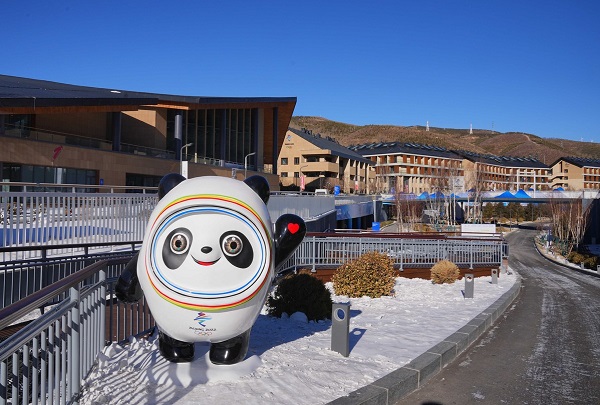Medical expert impressed by Beijing 2022's epidemic control

Beijing Winter Olympics' village in Zhangjiakou, the co-host city of 2022 Winter Olympics, is seen in this photo taken on Jan 3, 2022. [Photo/Xinhua]
Brian McCloskey, chair of the Beijing 2022 Medical Expert Panel, praised the effectiveness of the closed-loop system of the Beijing 2022 Winter Olympics and said he believed in the safety of the Games.
"I think my experience of the closed-loop system so far has left me very impressed. It is very efficient and I believe we can rely on it," McCloskey said at a media conference on Saturday at the Main Media Center of the Beijing Winter Olympics.
According to McCloskey, Beijing 2022 has three layers of protection to prevent the COVID-19 virus from spreading into China through the Games.
"The first is testing on the departure. The second is testing at the airport and the third is testing inside the closed-loop system," McCloskey said.
According to the Olympics' official website, participants need to follow clear COVID-19 testing rules for the Games before and after entering China. While participants need to have at least two negative pre-departure tests taken within 96 and 72 hours of their departure, they will immediately be tested upon arrival. Games participants are asked to take a PCR test at the airport. Trained customs staff will take throat and nose swab samples, which will be combined for analysis.
Additionally, Games participants will be PCR tested daily for COVID-19 to minimize the risk of undetected positive cases that could transmit the virus. Medical personnel will take throat swabs at sample collection sites at the Olympic Villages and other specific venues, including accommodation sites.
The PCR tests Beijing 2022 uses remain the gold standard for detecting COVID-19 infections. During Beijing 2022, these tests will be processed by laboratories which work with international standard reagents and high-quality devices.
Along with vaccination and the closed-loop system, comprehensive COVID-19 testing is one of the key principles to ensure a safe and successful Olympics.
"We would expect to see the number of positive tests of each of those layers as people move through that system. The other issue is we are going through the peak period of people arriving in China, and therefore we expect to see the highest number at this stage," McCloskey said.
The task of pandemic prevention won't be easy given the huge number of athletes, staff and media entering China during the Olympics period.
"Due to the ongoing COVID-19 pandemic, the possibility of having positive cases among participants of the Winter Olympics is very high. In some cities of China, we can see the emergence of positive cases, including Omicron cases,"said Huang Chun, deputy director-general of the Beijing 2022 Organizing Committee Pandemic Prevention and Control Office.
"As far as I know, the positive cases in Beijing recently are mostly Delta cases. Thanks to the decisive actions of the Beijing government, the pandemic situation in the city is getting better, and we believe within a few days, it will be fully contained.
"In terms of the fear the virus outside the city will spread into the closed-loop system or the other way around, we will continue to conduct strict closed-loop system management and have frequent testing. So we can detect positive cases at the first moment and cut the spread of the virus."
McCloskey stressed certain rules will be adjusted based on the situation and he's confident about the system.
"COVID is something unpredictable. Therefore you always need to be ready to review plans, change plans and monitor it closely. We are confident the system that we put in place is the right system. What we have seen so far, it's working well and expected to continue to work well," McCloskey noted.
- Top legislature schedules standing committee session for late February
- China's top legislator meets with Uruguayan president
- Senior legislator surveys Anhui on formulating outline of provincial 15th Five-Year Plan
- China's top legislator meets with British PM
- NPC deputies see more engagement with top court



